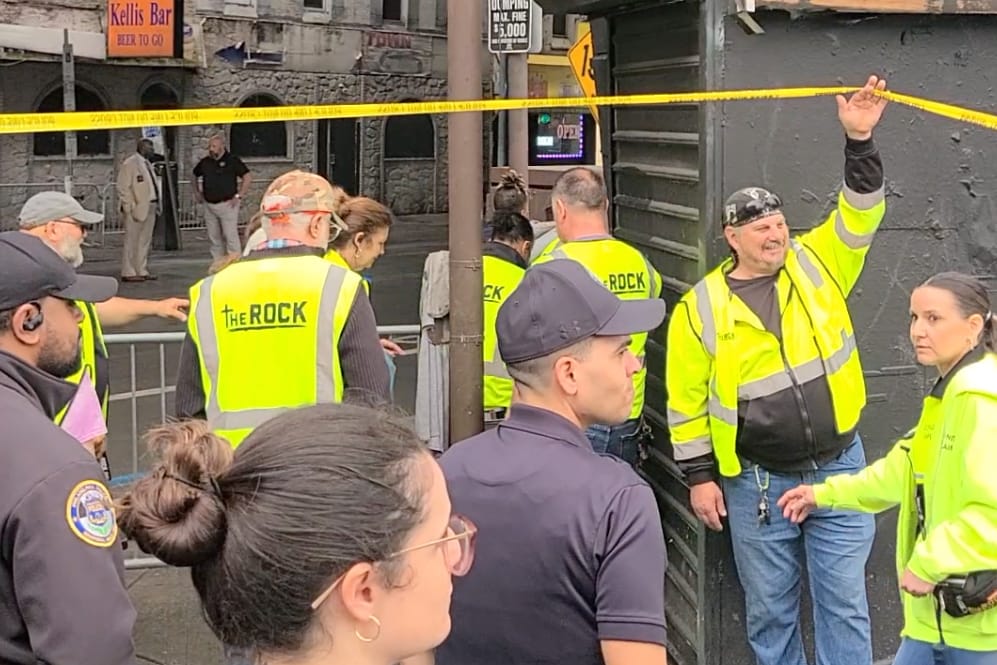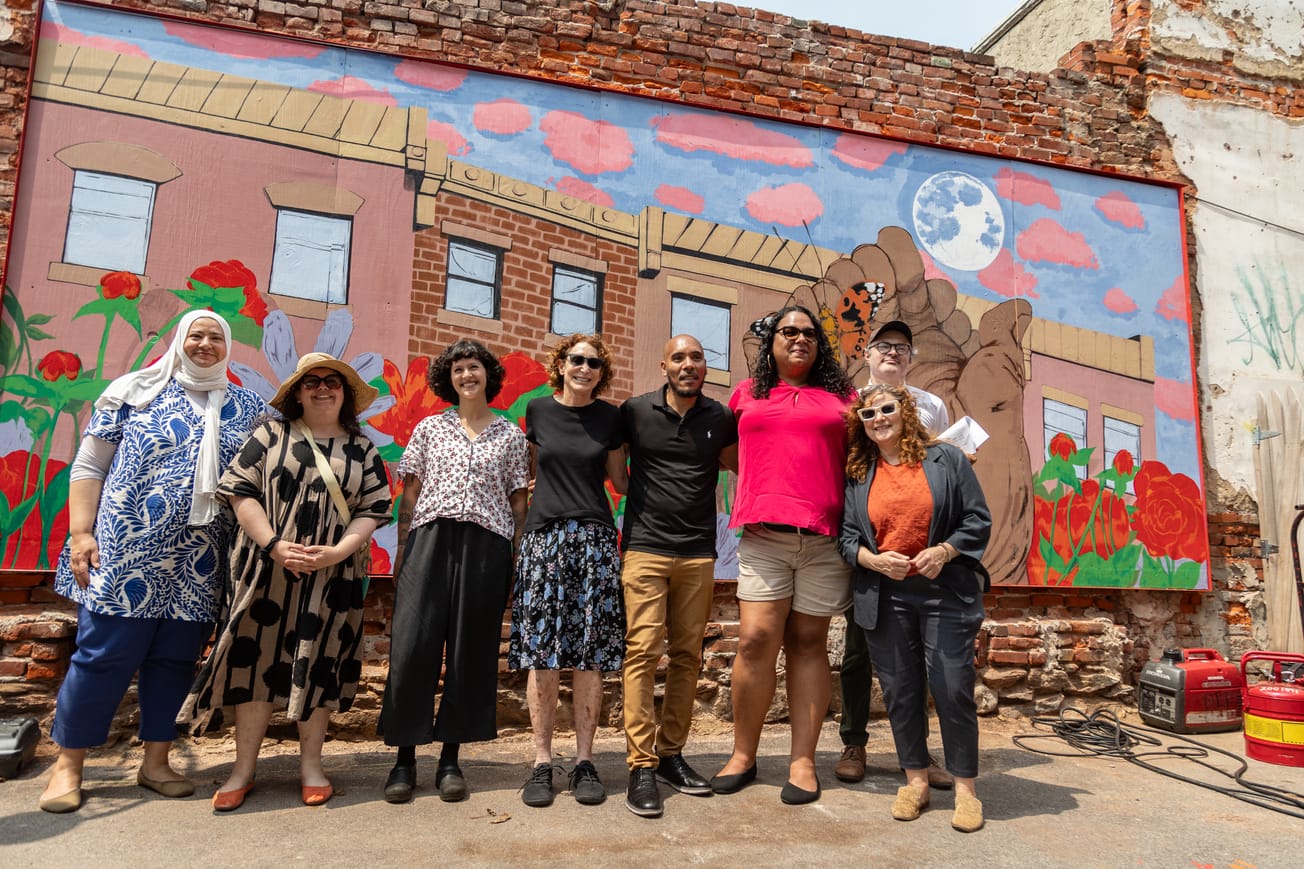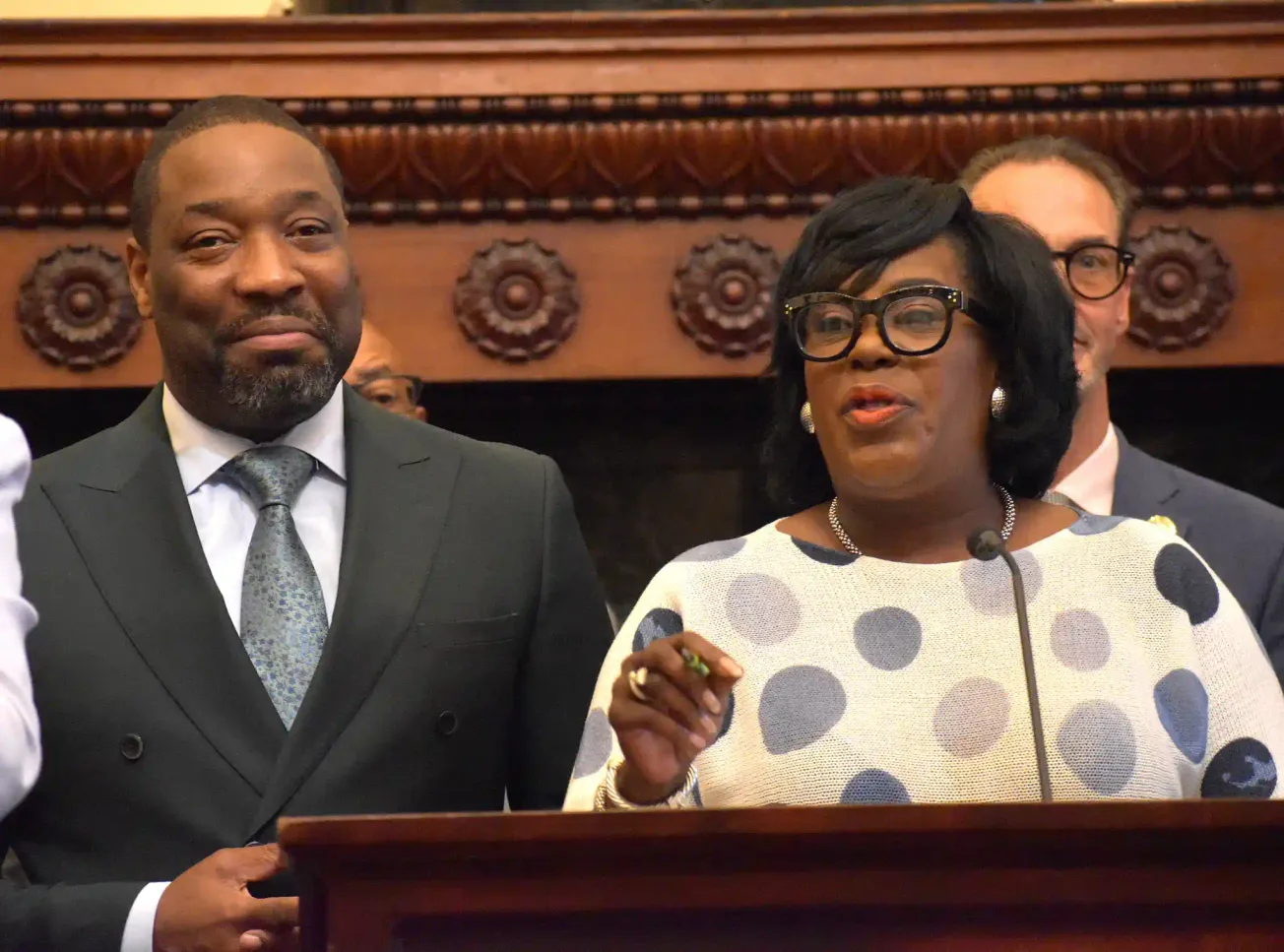In one video from the recent Kensington encampment sweep, a Philadelphia Police Department officer smiles and removes a metal barricade for a group of community chaplains before a PPD supervisor greets a chaplain with a hug. In another, police nod hello as about 30 church volunteers walk onto Kensington Avenue under the yellow police tape.
Earlier that morning, the PPD forcibly removed harm reduction advocates and legal observers from Kensington Avenue’s 3000 and 3100 blocks and denied access to health and service providers. As Rock Ministries chaplains led three people toward an ambulance, those who police pushed out watched from outside the perimeter.
“I didn't see Merakey or ODAAT. I didn't see other people,” said Sterling Johnson, an organizer with Philadelphia Housing Action. “I saw the chaplain squad, and that's concerning,”
In the weeks since the city dismantled the encampment, legal observers, harm reduction advocates, and service providers are wondering why the police gave Christian volunteers more access than others. Legal experts also say the city may have violated the Constitution if a religious organization was the only outside service provider allowed onsite during the sweep.
“I don't know why they were allowed within that area and why legal observers were not allowed in that area. None of that made sense to me,” said Amber, a legal observer with Up Against the Law who declined to share their last name for privacy reasons.
(Video courtesy of Amber)
Before the May 8 encampment clearing, city leaders said the day would be “service-led,” and those living on Kensington Avenue would have the opportunity to accept services. But PPD arrived hours before city services, and by 7:20, city sanitation workers were throwing away peoples’ tents and other items left on the street.
According to city representatives, the city’s outreach workers arrived at 7:30. By then, everyone staying on the two-block stretch was gone. Legal observers and harm reductionists said police ordered people staying in the encampment to leave.
Kevin Moore is the executive director of Courage Medicine on the 3000 block of Kensington Avenue, which offers medications for opioid use disorder (MOUD), wound care, counseling, psychiatric medicine, and STI, HIV, and Hep-C testing and treatment. Moore said they serve roughly 15 people who lived in the dismantled encampment but were not involved in the city’s resolution plans.
According to Moore, the morning of the clearing, police initially denied him access to his clinic. Once police let him inside, he argued with police officers for over two hours, trying to get permission for his patients to enter the facility.
Moore said he tried explaining why patients need their doctor and the clinic, but officers told him that they had services arranged as part of the sweep.
“I said, ‘No, no, no. These are established patients. You're talking about trying to connect people to services. This is a disruption of current services.’ That didn't convince them,” Moore said.
Everyone who had an appointment with Courage that day was eventually granted access but only after Noelle Foizen, the director of the Opioid Response Unit, gave Moore the clearance to escort people to and from the police barricade, he said.
Beacon Point Recovery Center, an in-patient drug treatment facility at 2301 E Allegheny Avenue, was also prohibited from accessing the barricaded blocks, according to Gina Hooper, Beacon Point’s former executive director. Hooper said Beacon Point had 13 available beds that day. She said the city did not contact the Beacon Point before the clearing, so she tried to offer what she had on her own.
“I talked to every cop, every official, that I could reach from the barricaded point to let them know who I was and I told them what I had to offer,” she said. “... And there was one individual who told me, ‘Just stand here. And when someone wants treatment, we'll come get you.’”
Hooper said she stood at the barricade for about five minutes until she felt like the police were not going to send people in her direction. So she left and weaved the sidestreets to help where she could.
“It confused me ... why no one reached out to me,” Hooper said. “I don't understand, if there were meetings being held, why that wasn't made public, why only certain organizations were only brought to the table.”
She said no one was placed in the beds available at Beacon Point that day.
Philadelphia Police Department spokesperson Eric Gripp said that Rock Ministries was allowed to pass through once as “a courtesy” and only spent a few minutes inside the barricades after a police officer “inadvertently” let their outreach workers in.
(Video courtesy of Amber)
Sharon Gallagher, a spokesperson for the Managing Director’s Office, said the encampment resolution team did not intentionally give Rock Ministries chaplains access beyond the barricade, nor was the church part of the resolution planning process with her office, which she said led the initiative.
“I can tell you that it was not planned or on purpose,” Gallagher said. “I can also tell you that as soon as our outreach teams saw them come in, we quickly asked the PPD to tell them they were not allowed in the area, and they left.”
Gallagher said that harm reduction organization Savage Sisters, which is located on the 3100 block, were also inside the barricades that day.
“Their location was within the perimeter,” she said.
Sarah Laurel, the executive director of Savage Sisters, said she got to her storefront by 6:30 a.m. and saw police telling people living in the encampment to move. She told police they weren’t supposed to be moving people, and they told her to go back into her building. She also said that initially, they wouldn’t let her staff inside the police tape to get to the building.
“Police were fighting with us,” she said. “It’s not like they were engaging with us and we were able to do services.”
According to Scott Burris, a Temple University law professor and the director of the university’s Center for Public Health Law Research, a city that says it doesn’t have all the services it needs to implement its plans should utilize harm reduction groups and all willing partners.
“The fact that the city instead is evincing really poor planning and execution so far and if it is favoring some groups over others for reasons that have nothing to do with the kind of services they deliver and aren't directed towards maximizing options for the people in Kensington, then it's just, more failure sooner than expected,” Burris said.
He also said it’s possible that the city is violating the Constitution by providing a faith-based group access while limiting access for secular ones.
“You could say, ‘Well, that sounds like there's certainly a strong argument that that was something that violates the ban on the establishment of religion,’” Burris said.
Allowing a church access inside the barricades over others isn’t necessarily unconstitutional and depends on additional context, said Kermit Roosevelt, a constitutional law professor at the University of Pennsylvania. However, he said if multiple organizations could have access but the city gave preference to a religious one, that could be unconstitutional.
“Sometimes you could have the religious organization be the only one providing services, but it would have to be because it was chosen for some reason other than that it was religious, and it's impossible to let the other ones do it,” Roosevelt said.

“Not everybody wants to accept Jesus”
At around 7:20 on the morning of the encampment clearing, about 30 community chaplains in bright yellow vests left Rock Ministries and walked north on Kensington Avenue.
Roz Pichardo, a community advocate who runs the Sunshine House across the street from Rock Ministries, said she heard chaplains asking people the day of the sweep, “Do you want prayer?”
Pichardo said she witnessed a man hiding between the back of a car and a wall as a group of Rock Ministries volunteers walked in his direction.
“He didn’t want to be approached like that,” she said.
Pichardo said she sat with him until they passed.
“They were out there in numbers, so when they approached someone, it was very intimidating,” she said. “Working in this field, not everybody wants to accept Jesus.”
Moore, who has worked in the neighborhood since 2021, said he has watched Rock Ministries be of “genuine assistance” in the community. He also said he’s watched them conduct outreach using what he would describe as best practice, but prayer is always part of the equation. He cautioned of the power dynamic between people living on the street and someone who asks to pray for them, which can make it hard to not consent to prayer.
“When you're on the street, you are kind of at the mercy of whoever you're talking to. And anyone who's dressed nicely and is trying to talk to you in a professional capacity is perceived as having more power than you,” Moore said.
Michael Worthy, who's been doing street outreach in Kensington for 15 years, was at the Sunshine House the day of the encampment sweep. Worthy, who is Christian, said he doesn’t have a problem with Rock Ministries chaplains praying for people, but he’s concerned when he sees chaplains asking to pray for people on the street before they offer the donations they have.
“I can't go over to you and say, ‘Hey, Brother, let me pray for you because I have these bags to give to you,’” he said. “That's enticing. And that's not cool.”
Kevin Bernard, a retired PPD officer who works as the lead chaplain at Rock Ministries, said outreach volunteers try to develop relationships with people before they pray. Bernard shared a story about a woman he met at six months pregnant with xylazine marks on her arm.
“She's gonna die, and that baby's gonna die. Trying to give her Jesus is like trying to give a drowning man water,” Bernard said. “We tell her we have help and resources available to her. We'll take her to that. If she says no, that's okay. Then we'll say, ‘Can we pray for you before you leave?’ ...and hopefully that prayer is going to have some effect.”
The day after the encampment clearing, Councilmember Quetcy Lozada thanked the Mayor, Rock Ministries, providers, and police — in that order — for “changing lives.”
“From my conversations with the administration and Rock Ministries, the encampment resolution and continued outreach on the 3100 block of Kensington Avenue successfully connected 312 individuals to meaningful services and resources,” wrote Lozada, who represents the 7th district, in a press release.
Lozada’s office did not make clear how and when those 312 people were connected to services.
According to a spokesperson for the Managing Director’s Office, 31 people received city services the day of the sweep, but only four of them were on the by-name list of people staying in the encampments.
The city did not share the number of people connected to services through Rock Ministries on May 8.
Buddy Osborn, the founder and lead pastor at Rock Ministries, did not say how many people the church connected to resources that day.
“Our ministry has reached out to youth, families, and to our community as a whole. Looking ahead will be no different than what we’ve been doing in our community in years past... loving and serving like Christ,” Osborn said. “If one person accepted help, that’s a win for them and for the Kensington community.”
Moore knows one person the city connected to treatment on May 8, but he doesn’t know where they went.
“My fear, frankly, given the presence of the chaplains ... I think it's far more likely that person ended up in a place where it's going to be harder to choose and sustain on [medications for opioid use disorder],” Moore said. “That intervention, if that's what happened, is an intervention that I would call, frankly, life threatening.”
PPD recently asked Rock Ministries to expand its street outreach team of about 200 volunteer chaplains who are dispatched to the streets almost daily. Chaplains connect people to secular and faith-based facilities, including long-term Christian recovery programs that don’t provide medications for opioid use disorder (MOUD) and require unpaid labor, called “work therapy.”
Still, Moore thinks the city should include Rock in addressing addiction and homelessness in Kensington, as long as the city also includes other resources and providers.
“The more service options, the better, and the more opportunities for engagement, the better. I'm not of the opinion that the Rock out en masse is a bad thing. It's a matter of that all the options are on the table.”
Have any questions, comments, or concerns about this story? Send an email to editors@kensingtonvoice.com.





